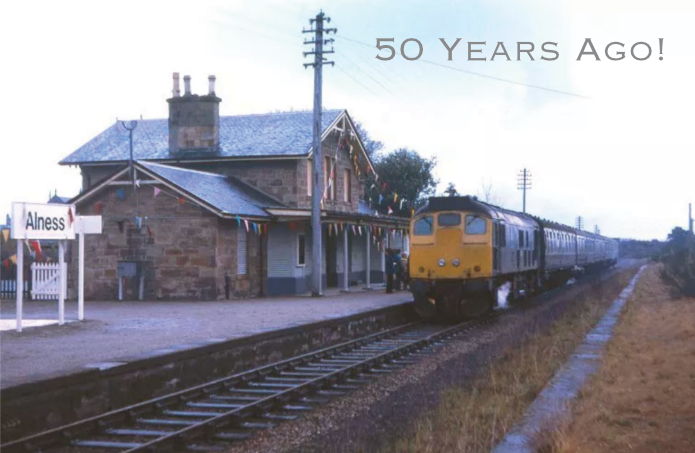


With the 50th anniversary of the reopening of Alness Station coming on 7 May this year it felt appropriate to ask FoFNL Committee member, retired signalman and Alness resident, Iain MacDonald for his thoughts.
I often performed relief duties at Alness for staff holidays, sickness or other reasons prior to it being closed on 13 June 1960. I strongly disagreed with it being closed as I considered it to be busier than Invergordon, which I didn't want to see closed either. It's good that is now 50 years since its reopening.
I well remember the original station building which was in much the same style as Kildary and Fearn, it also had a private waiting room which I think was for the Lea & Perrins people who had interests in the area.
Unfortunately after closure the building lying empty was vandalised and lead was stolen from the roof. It got into such disrepair that it was eventually demolished.

Prior to closure this was indeed a busy station, handling traffic for two distilleries, one (Dalmore) connected by a siding from the station and the other (Teaninich) served by road. Older locals and others will remember the three wheeled maroon and cream Scammell artic lorries of that time. It was common practice for these to deliver/collect at the time of day the distillery workers were given a dram - no one minded us joining in! A jam jar was the usual vessel for dispensing the beverage, not full but enough to put a glow on your cheeks.
During winter months one of the more onerous jobs was preparing and lighting Tilley lamps. The office and the waiting room had them, as did the two platforms which had three each. The lamps were of a circular design pressurised by a bicycle pump and wound up a pole about 15 foot high. If the pressure dropped, or they ran short of paraffin, they had to be lowered and attended to. There were also two storm type Tilley lamps on each corner of the bridge. Looking after these, together with fires to attend to in the station building, as well as signalling and clerical duties, was quite a big workload.
Alness was also an RAF base and when servicemen were going on furlough it wasn't uncommon for them to want to deviate from the route on their warrant, so we had to work out the different mileage and then charge five sevenths of the extra fare - with a queue of them it wasn't easy!
Another of our jobs was operating the weigh-bridge, there were lorries continually coming in to be weighed.
After the station reopened it was managed by staff from Invergordon with a Portacabin in place, by which time I'd moved to RETB signalling in Inverness. I think that remained until it became an unstaffed halt.
Anyway I have some happy memories of the old Alness Station.
Photos: [Top] A Class 24 brings an Inverness-bound train into Alness Station on the first day of service in May 1973 Photo: David Spaven [Inset] British Railways Scammell Scarab: London 1962 Photo: Don O'Brien, licensed under CC BY 2.0


Iain mentioned Lea & Perrins having a private waiting room. The story behind this is somewhat surprising: Charles William Dyson Perrins was the grandson of William Perrins, the co-originator of the recipe of the famous Lea & Perrins Worcestershire sauce. He inherited the business on the death of his father and in 1898 purchased Ardross Castle, near to Alness, as a summer retreat for his family. Dyson Perrins soon became a major benefactor to the town, in 1903 providing the Ardross - Alness Club (now called the Perrins Centre), which included a library, reading rooms and a billiard room. He also gave the town a bowling club and a golf club. In return for his generosity he was given a private waiting room at the station.
In her recent book, Lairds in Waiting, Anne-Mary Paterson paints a picture of the Perrin family's railway travels:
"Each year the family spent several summer months at Ardross Castle. The railway ran close to Davenham, their family home in Malvern, where there was a private siding into the property grounds. When the family went off to Ardross Castle, they hired a whole train, loaded it up in their siding with everything needed for their long holiday and together with their guests and servants, set off for Alness. Presumably the same thing happened in the opposite direction."
